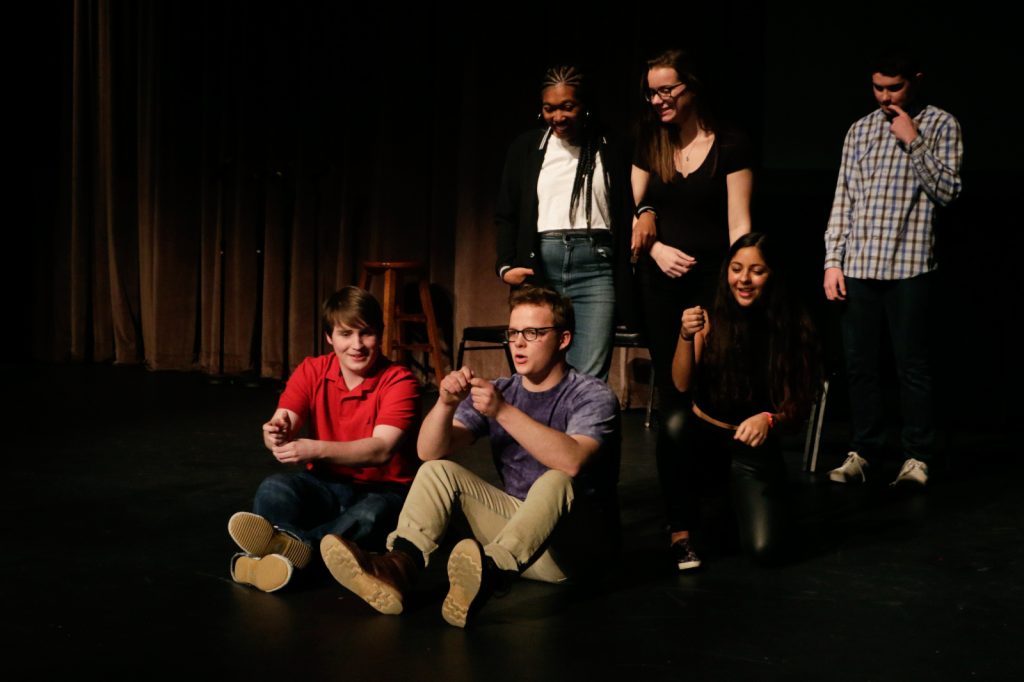Brooke Walker, president of receSs, one of GW’s improv troupes, said seeing the filled auditorium with hundreds shouting improv suggestions during Slate: the World College Comedy Festival made eight months of planning worth it.
Slate is the annual comedy festival planned and hosted by receSs, during which college improv groups from around the country perform and participate in workshops. This year, the show was headlined by Michelle Wolf, a contributor to The Daily Show and Late Night with Seth Meyers.
Walker said she began planning the festival in June, and once the election results came out, she solidified the date of the festival for the week after inauguration. Although the event occurs every year, Walker said this one’s was especially important because she wanted students to have the opportunity to “decompress” and laugh.
“Comedy is good, and especially in our current political climate, we need some comedy,” she said.
This year’s line-up featured receSs, GW’s Insert Here, Georgetown’s Improv Association, University of Delaware’s Riot Act, American University’s Mission Improv-able, Wesleyan’s New Teen Force and University of Michigan’s Midnight Book Club.
The groups performed a variety of improv styles, both short and long form. ReceSs built short-form performances off the audience suggestion “origami” and Mission Improv-able did a skit based off the word “Teletubbies.”
Michelle Wolf’s stand-up poked fun at relevant issues in politics, like former Democratic presidential nominee Hillary Clinton’s email scandal, and the political argument over women’s access to access birth control.
Walker said nailing down a big-name talent, like Wolf, is time-consuming, but coordinating with student groups is the most challenging part.
ReceSs first hosted Slate in 1998. At the first Slate, Amy Poehler headlined and an early release of the pilot of South Park premiered. The festival went on a ten-year hiatus, but in 2008, Slate resurrected with Donald Glover, better known as his stage name Childish Gambino, as the headliner.
Brady Hill, a sophomore member of American University’s group Mission Improv-able, said although the group is close to GW’s campus, they’ve never participated in Slate until this year. The group was “super stoked” because Slate is a unique opportunity to collaborate with other groups, which can help all groups involved improve at improv, he said.
“At festival we get to experience different viewpoints we wouldn’t otherwise get,” Hill said. “Being in an improv troupe is a close-knit family, so getting to do improv with other families helps you learn skills that you may not be learning in your group.”
Declan McLaughlin, the president of Delaware’s Riot Act, said the groups were allowed to perform for 15 minutes each, which is the most time they’ve been allotted at a festival. Despite the large amount of time allowed, McLaughlin said it was difficult for the group to decide what to perform at the show.
“We had a lot of things we can wiggle into those time slots,” McLaughlin said. “We weren’t sure if what we normally do would fill up this time how we want it to, but we feel pretty good about how it went.”
McLaughlin said the workshops are the most valuable part of attending festivals. Workshops are a time when groups play improv games together, meet one another and give feedback.
“When we practice every week, we do the same things and see the same things through the same lens,” McLaughlin said. “It’s nice to hear fresh perspectives on what we are doing and get new things to bring back with us.”




